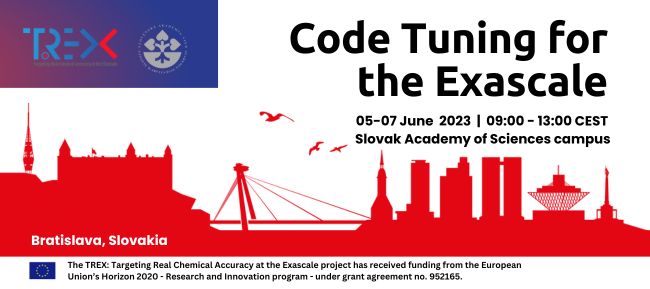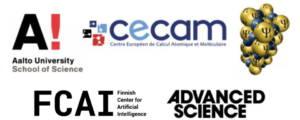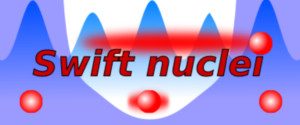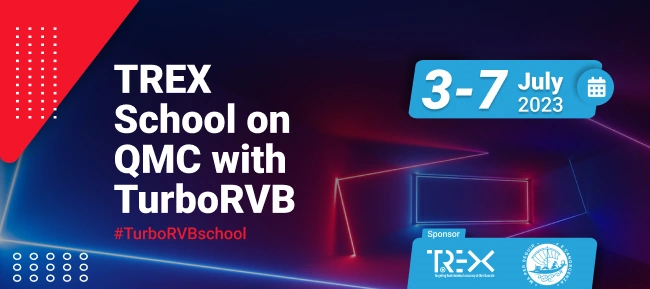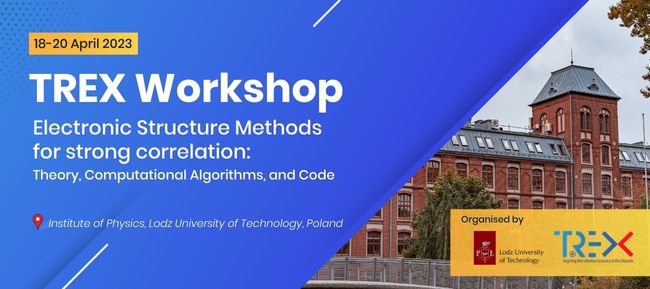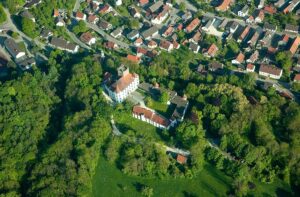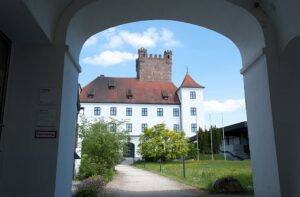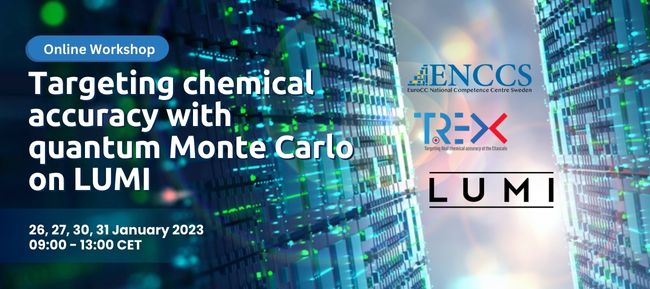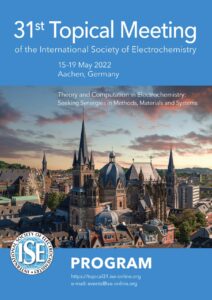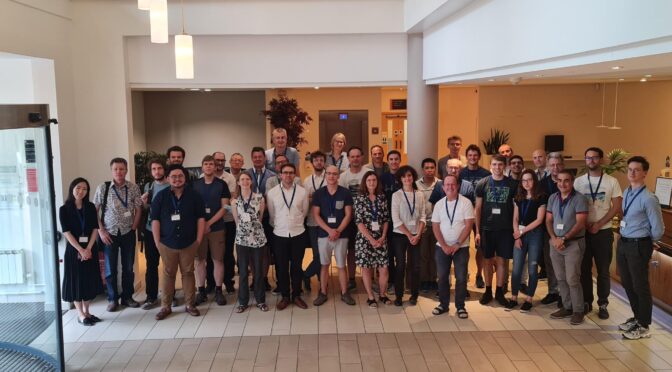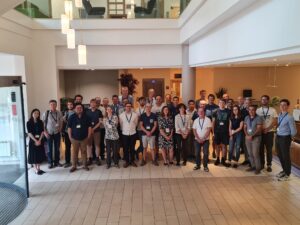The Young Researchers’ Meeting (YRM) of the European Theoretical Spectroscopy Facility (ETSF) is an annual event that brings together young researchers working on theoretical and computational approaches for studying the electronic and optical properties of materials. It is specifically aimed at MSc and Ph.D. students, as well as postdoctoral researchers. In other words, researchers who have not obtained yet a permanent position are eligible to attend, exchange, and present their research work. Over the years, the focus of the YRM has expanded beyond theoretical spectroscopy to include various other fields such as transport, magnetism, spintronics, correlated systems, and multiscale modelling, and more recently, in the current edition, we also included a session fully dedicated to quantum computing. The objective of the meeting is to provide a platform for young researchers to present their work, learn about state-of-the-art theoretical methods in their field and provide insights into related fields to help the ETSF community to grow further and expand their scope with ideas from different geographical areas and research orientations. Continue reading ETSF-19th Young Researchers’ Meeting
Category Archives: Events
TREX Workshop: Code Tuning for the Exascale
The TREX project is excited to announce that it will host a physical workshop entitled “Code Tuning for the Exascale” from June 05-07 in Bratislava, Slovakia. The workshop is designed for code developers and will have a strong emphasis on code optimisation. Participants are encouraged to bring their own codes to learn about techniques, methods, and solutions for enhancing performance and scalability across multiple platforms.
The workshop is co-organised by the TREX project and the Austrian, Czech and Slovak National Competence Centres for HPC.
The event will be organised in a mix of tutorials and training activities, focussing mainly on performance, power consumption, and energy efficiency in HPC systems and providing hands-on sessions on a series of codes and tools including TREX CHAMP code.
The language of the workshop will be in English.
Prerequisites
- The workshop is targeting developers and advanced HPC users with experience in parallel programming and C and/or C++ and/or Fortran programming languages.
- Attendees are kindly requested to bring their own laptop.
Important information
- We have a limited number of seats so please consider reserving your seat as soon as possible.
- Boarding: Light meals will be provided for lunches. A social dinner will be organized on the 2nd day.
- Venue: Slovak Academy of Sciences campus, Bratislava, Slovakia
Actively Learning Materials Science Workshop 2023
27.2.-3.3.2023 Helsinki/Espoo, Finland
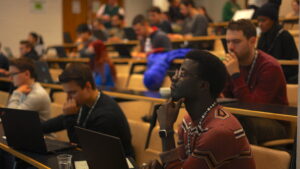
From 27th to 3rd March 2023 the Actively Learning Materials Science workshop was held at Aalto University in Helsinki/Espoo, Finland. This workshop welcomed 81 in-person participants from 10 countries (and many more among the 50+ online participants), also comprising 12 invited members among lecturers, teaching assistants, organizers and technical helpers. The event was sponsored jointly by CECAM, the Psi-k organization, Aalto University, and the Finnish Center for Artificial Intelligence, with talk and poster prizes sponsored by Wiley.
The workshop was dedicated to active learning (AL) algorithms, i.e. algorithms where machine learning datasets are collected on-the-fly in the search for optimal solutions. Paradigmatic examples in this area include (but are not limited to) Active Learning methods, Reinforcement Learning protocols, and Bayesian Optimization approaches. In the tutorials, talks and poster presentations, the participants showcased how AL enables to tackle outstanding problems in the optimal design of experiments, efficient traversal of complicated search spaces for electronic structure simulations and high throughput screening.
A key strength of AL techniques lies in the automated manner in which the machine learning model selects the data to include into the dataset via acquisition strategies. The requested data points can then be evaluated via computation or experiment and included into the model iteratively, until the optimal solution converges. The resulting compact, maximally informative datasets make AL particularly suitable for applications where data is scarce or data acquisition expensive. In this way, AL has helped accelerate materials discovery away from big-data and free of human bias. Despite recent successes, future applications of AL on experimental data are slow, given that key data infrastructure is still lacking. Working with multiple objectives, or multidimensional data remains challenging. Novel method development across the research field is needed to advance AL techniques and associated frameworks in materials research.
Actively Learning Materials Science (AL4MS) focussed on two key objectives, both from a pedagogical (first part of the event) as well as from an advanced perspective (second part of the event): 1) How could data infrastructures and AL algorithm development advance experimental materials discovery? 2) How could we combine multiple channels of information in the same AL model? Continue reading Actively Learning Materials Science Workshop 2023
Workshop on quantum dissipation by swift nuclei in condensed matter
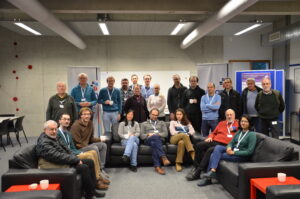
During 7-9 December 2022 the workshop on quantum dissipation by swift nuclei took place in Lausanne, at the CECAM headquarters. It was jointly funded by CECAM , Psi-k, and the Lawrence Livermore National Laboratory. It brought together key people in the fields of electronic stopping of nuclei in matter, non-adiabatic quantum dynamics, and density-functional theory and many-electron dynamics, to face the problem of quantum dissipation of swift nuclei in matter, from quantum friction effects of ions/molecules on surfaces and nanoconfined flow, to strong dissipation under irradiation. Invited speakers were prompted to talk about their recent work and ideas in their own topics which they thought could connect to the other subfields. The general ambition was cross-fertilisation,and exploring how connections of advances in one field might contribute to the others. In the spirit of traditional Psi-k / CECAM workshops, ample opportunity for discussion and lateral collective thinking was provided.
Full details can be found in the CECAM web page for this event.
The format consisted of three full days, including seven talks and a discussion session per day, after the afternoon coffee break. Slots of 40 min were allocated per speaker, aiming at 20-25 min of lecture and 15-20 min of discussion. Most of the talks were delivered in-person, The workshop was structured in three interconnected themes, one per day, starting with nuclei as projectiles (experiment, theory, simulation), followed by levels of theory for the dynamics of the electronic subsystem, to conclude with quantum coupled dynamics of electrons and nuclei, including connection to other non-adiabatic contexts. Each day had an associated discussion session led by one of the participants who identified important open questions to be addressed in the future, as arising from the presentations.
Key needs identified and actions proposed to address them can be summarised as follows:
- Promoting further interactions between modelers and experimentalists and ensuring that experimentalists’ input on relevant questions and coherence between models and experimental set up is clearly disseminated. To foster this goal, the organization of a follow-up workshop driven by experimentalists was proposed and will be pursued for 2024.
- Clarifying and disseminating state-of-the-art and open questions via a shared publication in the form of a roadmap paper. In particular, this work should include a more important participation by the cognate community of non-adiabatic dynamics applied to chemical processes, which has developed a number of quite advanced tools, especially in the field of photochemistry.
- Identify challenges and benchmark systems for currently existing techniques. In particular, an adequate description of electron thermalisation after a strong energy pulse was considered a timely and suitable challenge for the dynamical simulation techniques being used (such as TDDFT).
Concluding:
It was considered a quite successful meeting by all, deserving further exploration.
Organisers:
- Emilio Artacho (Nanogune, DIPC, Ikerbasque, U. Cambridge),
- Sara Bonella (CECAM, EPFL),
- Alfredo Correa (Larence Livermore National Lab)
- Jorge Kohanoff (U Complutense, Madrid)
TREX School on QMC with TurboRVB
We are inviting young students and more senior researchers interested in learning ab initio quantum Monte Carlo, one of the most accurate and versatile approaches for materials and electronic structure calculations, to apply for the upcoming TREX School on QMC with TurboRVB, taking place from 3-7 July 2023 in Trieste, Italy. This QMC summer school is organized by TREX project and it will be held in the Scuola Internazionale Superiore di Studi Avanzati (SISSA).
It will be a great event to learn TurboRVB (QMC algorithms), TurboGenius (command-line tools to make QMC calculations user friendly), and TurboWorkflows (high-throughput computations) codes for QMC applications and tutorials. And, this time, to meet your peers and colleagues in person.
After many years of development, the TurboRVB code will be officially released as an open source package during this school.
Why should you join the School?
- The TREX project is offering participants free lodging, coffee breaks, lunch breaks and a social dinner during the School. This will be the perfect occasion to meet your peers and colleagues in person, share experiences and learn more about QMC methods and how to use them in practice.
- Participants are invited to submit their poster contributions and present results and ongoing activities at the School. The best poster winner will win a stay of one week at Sorbonne University, Paris, in the Quantum Theory of Materials group (IMPMC)
- After many years of development, the TurboRVB code will be officially released as an open source package during this school. Do not miss this event!
- Get the chance to explore beautiful Trieste, top-ranked in Italy for its quality of life, and to discover this town renowned for its scientific institutions. If you want to extend your stay in Trieste for one more week, the week after the school there will be a workshop organized at the ICTP about “QMC methods at work for describing novel states of matter”, a perfect follow-up of our school! Please, note that a separate registration is required for the ICTP workshop. Please, also note that the TREX project is not covering participant’s travel nor extra costs.
Important information
- We have a limited number of seats so please consider submitting your application as soon as possible. Deadline for application is 28.05.2023 COB.
-
Attendees are supposed to have a background in condensed matter theory and/or quantum chemistry.
- Attendees are kindly requested to bring their own laptop.
- We invite the attendees to bring a poster with them about their own research (even if unrelated to QMC). A poster session will be organized during the school and the three best posters will be awarded. The best poster prize is a stay of one week at Sorbonne University, Paris, in the Quantum Theory of Materials group (IMPMC)
MORE INFO | PROGRAMME | REGISTRATION | VENUE
TREX workshop on electronic structure methods for strong correlation: theory, computational algorithms, and codes
TREX project is inviting advanced PhD students and post-docs to join the “TREX workshop on electronic structure methods for strong correlation: theory, computational algorithms, and codes” which will be held on 18-20 April 2023 at the nstitute of Physics, Lodz University of Technology, Poland.
The primary purpose of the workshop is to provide insight into both theory and computer implementation of electronic structure methods dedicated to strongly correlated materials.
The workshop provides a unique opportunity to learn theories behind electronic structure methods for strongly correlated materials and to get insight into their computer implementation in open-source TREX flagship codes:
Each workshop session will consist of lectures and tutorials. Lectures will present theoretical backgrounds of the covered methods and numerical algorithms used in their computer implementation. Tutorial sessions, led by code developers, will provide participants with hands-on experience on using codes, paying special attention to high performance computing.
A separate session will cover application of machine learning to predicting molecular properties.
Participants
The workshop is open to all participants. Lectures will have a didactic character and we strongly encourage advanced PhD students and post-docs to participate.
Requirements
Basis knowledge of ab initio electronic structure methods is required.
Fee
There is no registration fee. Free lodging in the university guest house will be provided to a limited number of participants, based on the first-come, first-serve basis (early registration is encouraged). Lunches are provided to all participants.
REGISTRATION | PROGRAMME | EVENT COMMITTE | VENUE
Computational modelling of batteries: First-principles quantum chemistry meets continuum approaches
Computational modelling of batteries:
First-principles quantum chemistry meets continuum approaches
Castle Reisensburg near Ulm/Germany
October 23 – 26, 2022
Description of the Event
Due to the importance of electrochemical energy storage for our future sustainable supply of energy, worldwide there are constantly increasing research and development activities with respect to secondary, i.e. rechargeable batteries. Still, due to the complexity of batteries, our fundamental understanding of structures and processes in batteries is to large extent still rather limited. In many areas of science, theoretical and computational modelling plays an increasingly important role, also in the field of battery research. Hence, a close collaboration between experimental and theoretical researchers can be very beneficial. However, from a theoretical and computational point of view, the modelling of batteries is rather challenging due to the complexity of the structures and processes present in the anode, electrolyte, and cathode of batteries and at their interfaces.
In addition, the relevant processes in batteries occur at a wide range of length and time scales, from the nanometer and picosecond scale with respect to the elementary atomic processes upon charge and discharge up to the centimeter and year scale with respect to the operation of batteries and aging and degradation processes. The modelling of structures and processes at these vastly different scales requires rather different theoretical and numerical methods, from quantum chemistry methods on the atomic scale to continuum models on the macroscopic scale. Still, the processes at the different scales are strongly interrelated. For example, any long-term degradation process is initiated and thus based on chemical processes on the atomic scale.
Unfortunately, the scientific communities performing battery modelling at the atomistic and the macroscopic length scale are rather disjunct. Hence it was the goal of the workshop on “Computational modelling of batteries: First-principles quantum chemistry meets continuum approaches” at Castle Reisensburg near Ulm from October 23 to 26, 2022, to bring together world-leading experts of both communities. The first aim was to foster the exchange between the two communities to create an awareness of the theoretical and numerical challenges of the other field. Secondly and almost more importantly, the workshop was intended to inspire collaborations between researchers of both communities in order to allow a holistic theoretical and numerical description of structures and processes from the atomistic to the macroscopic scale.
This workshop was organized by Axel Groß of Ulm University and Arnulf Latz of the Helmholtz Institute Ulm for Electrochemical Energy Storage. Both are also PIs at the Cluster of Excellence POLiS – Post-Li Storage. This workshop was generously supported by the German Science Foundation (DFG), the Cluster of Excellence POLiS, and by the Psi-k Network for electronic structure calculations of complex processes in materials. Continue reading Computational modelling of batteries: First-principles quantum chemistry meets continuum approaches
Targeting chemical accuracy with quantum Monte Carlo on LUMI
Are you a Ph.D. student or researcher wanting to learn more about Quantum Monte Carlo methods?
The TREX Centre of Excellence together with the EuroCC National Competence Center Sweden is organising a dedicated online workshop on 26, 27, 30, 31 January 2023 providing a comprehensive introduction to QMC methods and their practical application in molecular systems with the combined use of Quantum Package and the quantum Monte Carlo CHAMP code developed in the context of European Commission funded TREX project.
Each day of the workshop will be running from 09:00 to 13:00 CET and will be structured in two part:
- A set of lectures where participants will get the chance to learn about the foundations of QMC and its application to molecular systems as well as how QMC methods can help to solve current challenging problems in chemistry.
- A set of hands-on tutorials with practical QMC simulations using the Quantum Package and CHAMP codes. The tutorials will be running on LUMI, the first pre-exascale supercomputer of the EuroHPC Joint Undertaking which has now become the fastest and most energy-efficient supercomputer in Europe.
The workshop is intended for Ph.D. students and young researchers established in the European Union or a country associated with Horizon 2020. You can read more about the countries associated with Horizon2020 here. No previous experience on QMC methods is required.
The complete programme with speakers, agenda and registration can be found here:
https://enccs.se/events/2023-01-chemical-accuracy-with-quantum-monte-carlo/
Registration is open until 20 January 2023, 12:00 CET when selected participants will be announced.
31st Topical Meeting of the International Society of Electrochemistry
31st Topical Meeting of the International Society of Electrochemistry
15-19 May 2022, Aachen, Germany
Theory and Computation in Electrochemistry: Seeking Synergies in Methods, Materials and Systems
Description of Event
Theory and computation in electrochemistry have reached a level, on which they coexist with experiment on an equal footing in many areas. The intention was for the 31st Topical Meeting of the International Society of Electrochemistry to provide a forum for a vibrant cross-disciplinary exchange along established and emerging directions in physical theory, computational electrochemistry, and continuum modeling. The meeting program covered topics from fundamental challenges in electrochemistry to practical challenges in the production or removal of chemicals, energy conversion and storage, sensing, and electronic and photonic (meta-)materials. Contributions embraced spatial scales from atomic to electrode level, and temporal scales from surface reactions to aging and degradation. Following a 2012 topical meeting with a focus on theory and computation in electrochemistry, a meeting with the same focus in 2022 was overdue. Continue reading 31st Topical Meeting of the International Society of Electrochemistry
Psi-K/CECAM Flagship workshop “Light-matter interaction and ultrafast nonequilibrium dynamics in plasmonic materials”
CECAM/Psi-K Flagship Workshop “Light-matter interaction and ultrafast nonequilibrium dynamics in plasmonic materials”
July 18, 2022 – July 21, 2022, University of Warwick, UK
Description of Event
The Psi-K & CECAM sponsored meeting “Light-matter interaction and ultrafast nonequilibrium dynamics in plasmonic materials” was held from 18th to 21st of July 2022 at the University of Warwick. It featured 28 talks, 4 discussion sessions, and 10 posters. It was attended by 42 in-person attendees from 12 different countries and broadcast as a webinar with between 3 and 17 virtual attendees at any time.
A full theoretical description of light-matter interaction and plasmon-induced ultrafast non-equilibrium dynamics is a formidable challenge that demands an intrinsically multidisciplinary and multiscale approach. A variety of different approaches based on time-dependent Density Functional Theory, many-body perturbation theory, molecular dynamics, Mie theory, continuum electrodynamics, and combinations thereof have emerged in recent years to address many of the open questions in plasmonics. Further improvements in theoretical descriptions are crucial to optimize SPP generation and amplification in materials, to tailor losses and plasmonic lifetimes, as well as to integrate plasmonic effects into semiconductor technology to create new quantum materials. Due to the diverse aspects of this problem, a coherent research community around theoretical plasmonics is only slowly emerging.
The aim of this workshop was to assess the state of computational methods in this field, to identify major challenges, as well as to provide engagement between disparate communities to create space for cross-community collaboration. Continue reading Psi-K/CECAM Flagship workshop “Light-matter interaction and ultrafast nonequilibrium dynamics in plasmonic materials”

